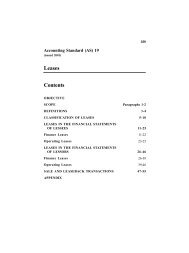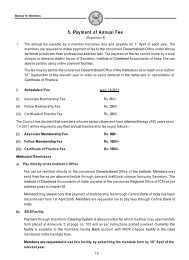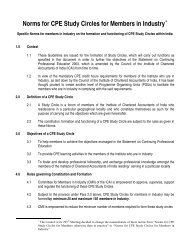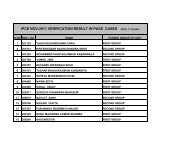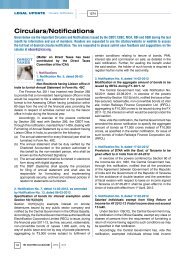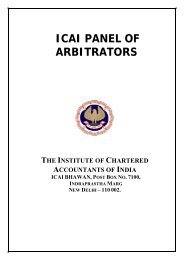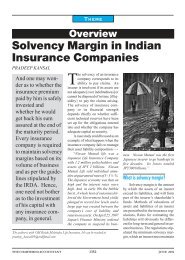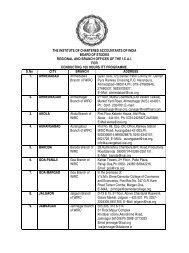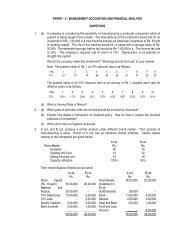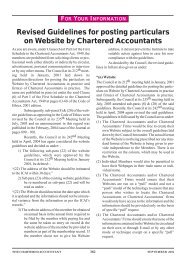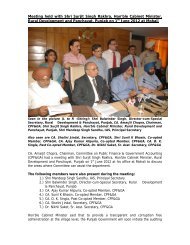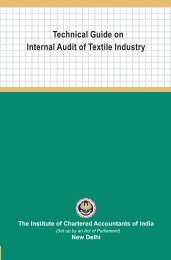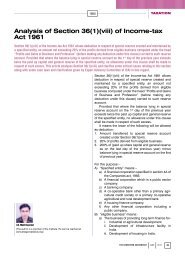The Chartered Accountant
The Chartered Accountant
The Chartered Accountant
You also want an ePaper? Increase the reach of your titles
YUMPU automatically turns print PDFs into web optimized ePapers that Google loves.
Section Remarks<br />
TAXATION<br />
10(6) (VI). Remuneration of an employee of a<br />
foreign enterprise is exempt from tax<br />
if his stay in India is less than 90 days<br />
in aggregate during the financial year:<br />
<strong>The</strong> remuneration received by him<br />
as an employee of a foreign enterprise<br />
for services rendered by him<br />
during his stay in India, provided<br />
the following conditions are fulfilled—<br />
<strong>The</strong> foreign enterprise is not<br />
engaged in any trade or business<br />
in India;<br />
His stay in India does not exceed<br />
in the aggregate a period<br />
of ninety days in such previous<br />
year; and<br />
Such remuneration is not liable<br />
to be deducted from<br />
the income of the employer<br />
chargeable under this Act;<br />
This is subject to further relaxation under<br />
the provisions of Double Taxation<br />
Avoidance Agreement entered into by<br />
India with the respective country<br />
10(6) (ii) Remuneration received by a foreign<br />
expatriate as an official of an embassy<br />
or high commission or consulate or<br />
trade representative of a foreign State<br />
is exempt or reciprocal basis<br />
10(6) (viii) Remuneration from employment on a<br />
foreign trip provided the stay of the<br />
employee does not exceed 90 days in<br />
the financial year<br />
10(6) (xi) Training stipends received from foreign<br />
Government<br />
10(8) &<br />
(10(8B)<br />
Remuneration under co-operative technical<br />
assistance programme or technical<br />
assistance grants agreements.<br />
Special Provisions Relating to Non-Residents<br />
Chapter XIIA of the Income-tax Act deals with special<br />
provisions relating to certain incomes of nonresidents.<br />
Section Remarks<br />
115D Provisions regarding computation of<br />
investment income of NRIs.<br />
115E relates to investments income and long-<br />
term capital gains of NRIs, such income<br />
being taxed at concession flat rates<br />
115F capital gain is not chargeable on transfer<br />
of foreign exchange assets under certain<br />
circumstances<br />
115G <strong>The</strong> NRIs need not file their return of<br />
income if their total income consist<br />
only of investment income or long-term<br />
capital gains or both and proper tax has<br />
been deducted from this income<br />
115H. Benefits under this chapter are available<br />
even after the assessee becomes a resident.<br />
115I <strong>The</strong> provisions of this chapter would<br />
not apply if the assessee so chooses<br />
Double Taxation Avoidance Agreement<br />
(DTAA)<br />
<strong>The</strong> Central Government acting under the authority<br />
of Law (Section 90) has entered into DTAAs with<br />
more than 60 countries. Such treaties serve the purpose<br />
of providing protection to the tax payers from<br />
double taxation. As per section 90(2), in relation to an<br />
assessee to whom any DTAA applies, the provisions<br />
of the Act shall apply only to the extent they are more<br />
beneficial to the assessee. <strong>The</strong> provisions of these<br />
DTAAs thus prevail over the statutory provisions.<br />
Scope of the provision - In case of conflict between<br />
Income-tax Act and provisions of DTAA, provisions<br />
of DTAA would prevail over provisions of Incometax<br />
Act. Section 90(2) makes it clear that the Act gets<br />
modified in regard to the assessee in-so-far as the<br />
agreement is concerned if it falls within the category<br />
stated therein - CIT v. P.V.A.L. Kulandagan Chettiar<br />
[2004] 137 Taxman 460/267 ITR 654 (SC).<br />
<strong>The</strong> provisions of section 90 prevail over those of<br />
sections 4, 5 and 9, and therefore, even where a business<br />
connection is established the profits of a company<br />
could be free from tax if they are covered by<br />
a Double Taxation Agreement - CIT v. Vishakhapatnam<br />
Port Trust [1983] 144 ITR 146 (AP).<br />
<strong>The</strong> Double Taxation Avoidance Agreement (DTAA)<br />
THE CHARTERED ACCOUNTANT 987 DECEMBER 2008



